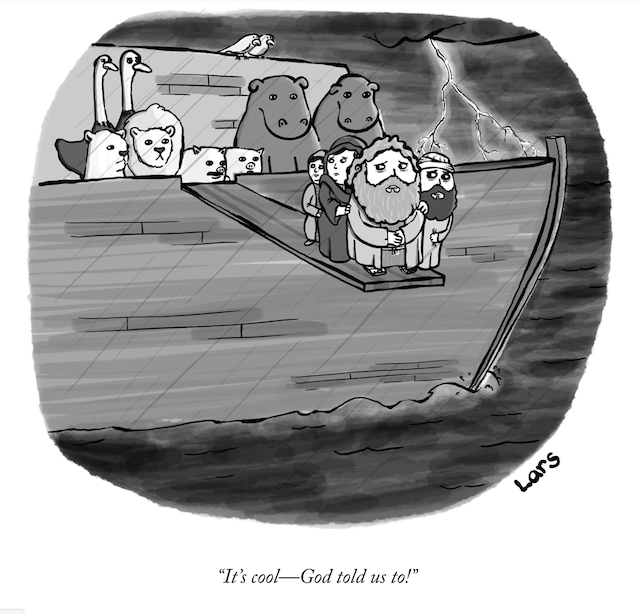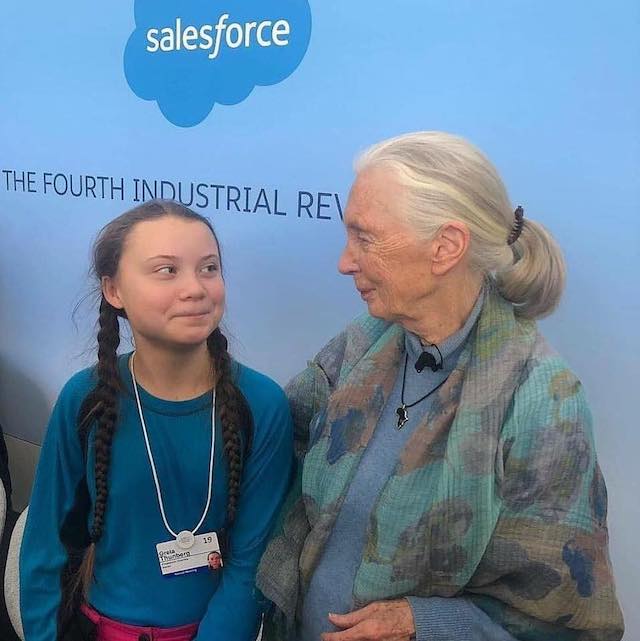
cartoon by Lars Kenseth in the New Yorker
What have we to do
But stand with empty hands and palms turned upwards
In an age which advances progressively backwards?
(TS Eliot)Hiraeth (heer-eye-th) (Welsh)
A word with no direct English translation. It means a longing for a home, or a time that felt like home. This isn’t homesickness, it’s a deep yearning for somewhere that may not quite exist as you remember it.
(from the Guardian)
PREPARING FOR CIVILIZATION’S END

cartoon by Ed Hall
What if we stopped pretending?: Jonathan Franzen talks about the inevitability of collapse. The environmental establishment is, of course, aghast that such a celebrity would write candidly about the fact climate collapse is occurring and complete collapse is inevitable (such acceptance threatens their ‘hopium’ jobs); Grist went so far as to call him a “climate coward”, and Scientific American told him to “shut up”. Ah well, two steps forward, one step back. Excerpt:
All-out war on climate change made sense only as long as it was winnable. Once you accept that we’ve lost it, other kinds of action take on greater meaning. Preparing for fires and floods and refugees is a directly pertinent example. But the impending catastrophe heightens the urgency of almost any world-improving action. In times of increasing chaos, people seek protection in tribalism and armed force, rather than in the rule of law, and our best defense against this kind of dystopia is to maintain functioning democracies, functioning legal systems, functioning communities. In this respect, any movement toward a more just and civil society can now be considered a meaningful climate action. Securing fair elections is a climate action. Combatting extreme wealth inequality is a climate action. Shutting down the hate machines on social media is a climate action. Instituting humane immigration policy, advocating for racial and gender equality, promoting respect for laws and their enforcement, supporting a free and independent press, ridding the country of assault weapons—these are all meaningful climate actions. To survive rising temperatures, every system, whether of the natural world or of the human world, will need to be as strong and healthy as we can make it.
You and I are doomed; the Earth not so much: Martin Shaw suggests how we can come to accept collapse, and in the process get over ourselves. “In the darkness, we remember what we love the most. Thanks to Eric Lilius for the link.
Collapse: the only realistic scenario: In an excellent series on collapse by French documentarian Clément Montfort, scientist Arthur Keller explains how and why collapse is now inevitable. Thanks to the NTHELove group for the link.
A Latin-American leader takes responsibility for his country’s desperate emigrants: “It is our fault”, said El Salvador’s President Nayib Bukele responding to the death of a father and daughter who drowned while trying to reach the US. His country exemplifies what collapse looks like: Desolated soils, stolen and exhausted resources, political corruption due largely to foreign and plutocratic interference and bribes exhausting the treasury, gang violence and extortion filling the local power vacuum fuelled largely by foreign money and arms, endemic impoverishment and unrepayable debts thanks to exploitation and economic blackmail by mostly foreign ‘investors’ including the IMF. There are scores of countries around the world in a similar state of irreparable collapse; they mirror the collapse of impoverished poor families everywhere as inequality of wealth, income and power skyrockets. Study them, and see the possible future for all of us in a world of collapse. The Salvadorian president’s acceptance of responsibility, brave as it is, is misplaced; no one is to blame for what we all, with the best of intentions, have created.
LIVING BETTER

image from Greta’s Facebook page
Why public disruption is necessary: XR guru Roger Hallam on the necessity of disruption to achieve change. Goes along with their excellent FAQ.
How to stop procrastinating: Nothing terribly new here, but some useful reminders — a behavioural scientist suggests:
• set specific, concrete, doable goals
• break big projects into small tasks
• set daily time/place routines and stick to them for at least 2 months
• schedule downtime and deadlines that must be met before each
• sleep, eat and exercise well
• banish distractions, mess,
• find ways to make worthwhile tasks easier
1619 Podcast: The NYT is running a series on the 400th anniversary of the start of slavery in the US, on several media. The print stuff is all buried behind the paywall, but the podcast is available to all. For now, anyway.
The True Story Award: This is a new award, originating in Switzerland, recognizing exceptional narrative journalism that illuminates non-western perspectives on world events. Here are the latest winners, some of which are moving; others are gut-wrenching. Some staggeringly-courageous journalism. Here is a gentler story that particularly moved me, as it describes how a citizens’ assembly can transform worldviews and morph distrust into solidarity. Thanks to Tree Bressen for the links.
Advancing women artists: To overcome misogyny in the arts, an American-Italian women’s collaborative is bringing to light some extraordinary and overlooked women artists in Tuscany‘s “museums, churches and storage facilities”. Thanks to Nathaniel James for the link.
Women game designers kick butt: Some of the cleverest, most engaging, and most collaborative games were and continue to be designed by women.
POLITICS AND ECONOMICS AS USUAL

image from Twitter, original source unattributed
Quantum shift in law-enforcement thinking?: There’s been a major shift in US sensibilities about what constitutes the greatest threat to public safety — essentially from a belief that it was “foreigners” (of various stripes), to a belief that it is deranged young male right-wing racist loners goaded by predatory right-wing media. There was only so much evidence that could be ignored by even the most NRA-revering Americans before they realized the truth. But recently there is evidence of an even more surprising shift — the same belief has penetrated law-enforcement agencies, long a bastion of right-wing attitudes. As evidence of this, concerted, coordinated police investigations have recently thwarted many US attacks, almost all by this disturbed and dangerous demographic. We can only hope that as this dawns on more and more people, there will be a greater willingness to rein in the massive proliferation of WMDs in individuals’ hands, greater scrutiny of militarized right-wing hate groups, and a growing abhorrence for incitement to (and defence of) violence by politicians and the media. And that religious leaders and their followers will no longer support or tolerate politicians, organizations and parties that pander to hate, violence, disrespect and fear.
How green are the Democratic Party candidates?: Here’s a “rubric” that assesses where all the declared candidates stand on the various issues in the Green New Deal. And here’s a profile of the demographics of the supporters of the leading candidates — probably not what you expected.
How US Republicans subvert democracy: Right-wing extremists in the US have long been advocates of “end justifies any means” tactics. Now, in Oregon, Republican politicans are subverting the will of the people by leaving the state to deprive the majority of the quorum they need to pass climate catastrophe legislation.
Boris Johnson “doesn’t remember” calling the French “turds”: Only a BBC interviewer would have the courage to call the clownish unelected British PM on his blatantly xenophobic and despicable generalizations. He laughed it off and didn’t deny saying it. There is a growing realization that the UK won’t survive his tenure, and will break up.
The paradox of fossil fuel subsidies: George Monbiot reports: “The oil and gas industry intends to spend $4.9T over the next 10 years, exploring and developing new reserves, none of which we can afford to burn. According to the IMF, every year governments subsidise fossil fuels to the tune of $5T – many times more than they spend on addressing our existential predicament. The US spends 10 times more on these subsidies than on its federal education budget.”
Canada’s right-wing conservatives declare war on health-based food guide: The extremist Scheer Conservatives want to ditch the evidence-based food guide and return to the old guide that was heavily influenced by the meat, dairy and processed foods industry. To them, it seems, the health of Big Ag is more important than the health of Canadian citizens. Health experts called Scheer’s plans “intensely stupid”. These are the same nutbars who when last in power eliminated the census and replaced it with a voluntary household survey (when it was restored, a host of new and important information about Canada’s demographics was recovered). But the anti-science Conservatives are running at 36% in the polls, which in Canada’s flawed FPTP system (which Trudeau promised to reform, but then reneged), that could be enough to put them back in power later this year, with the help of the misinformation bots already hard at work. Arno Kopecki laments “What’s a progressive voter to do?” — a good read for Canadian voters, that confirms what is true almost everywhere where an election now looms: the real work begins after the polls close.
And everyone has their price: Despite fierce opposition from many First Nations across Canada, a First Nation business plans to buy 51% of the Tar Sands pipeline that Trudeau bought to bail out Kinder Morgan. The pipeline, recently approved in a farcical process by a Trudeau-appointed Board, will be used to send the ecologically ruinous tar sands’ bitumen sludge from Alberta to China through Vancouver and the Salish Sea. Bitterly disappointing. But opposition First Nations groups and other opponents have filed multiple suits and vow the pipeline will never become operational.
The pathetic misogyny of male critics: There must be some kind of common character flaw that leads some men to decide to become critics. Perhaps it’s so they can deflect criticism from themselves. Whatever it is, the “profession” of “critic”, this Guardian article points out, seems rife with males who are utterly aware of their own misogyny and double standard.
… and the misogyny of birders: The role of female ornithologists has been likewise under-recognized and neglected. And it’s not only the human females studying birds who’ve been overlooked, but the female birds too, which turn out to be a lot more important to avian evolution than anyone expected.
And the rich just keep on getting richer: The top 1% of Americans’ combined net worth has risen from $8T to $29T over the last 20 years. Over the same period, the net worth of of the bottom 50% of Americans has slid into the red — ie more than half of Americans now are under water (owe more than they own). Thanks to AD Mitchell for the link.
Post-note on Epstein: I’m holding off saying anything substantial on this, because I think we’ve just seen the tip of the iceberg so far. Attempts to bury the extent of the involvement of a host of the world’s richest and most powerful men are, I think, going to fail this time, because some of those implicated are getting cold feet and talking (and offering absurd excuses) before the SHTF. Stay tuned.
FUN AND INSPIRATION

left: image of a hand dryer in a washroom in a Manitoba shopping mall, original source unattributed; right: image of a sign above a sink in a washroom in Thailand, via languagelog — geez! what CAN you do in a washroom these days?
The seal: My friend Bob Turner plays with a seal off the coast of our island, and then wonders if he should have. World-class video. Bonus: Belugas in Lancaster Sound in the Canadian arctic.
Georgia on my mind: I confess to having become deeply infatuated with the music and musicians of the ancient Republic of Georgia. The astonishingly-talented Georgian pianist Khatia Buniatishvili talks eloquently and refreshingly about how it feels to play Mussorgsky’s Pictures at an Exhibition. A Georgian adolescent, Salome Tsulukidzis, with her grandfather’s accompaniment, sings a brilliantly nuanced and accomplished version of a Georgian folk song Tetri Verdebi (White Roses). And a Georgian jazz group riffs off their renowned countryman Giya Kancheli’s famous film music (original version played by Khatia here). I wonder to what extent Georgians’ vocal versatility is attributable to their unique and complex polyphony (which predates western polyphony).
The phenomenon of “net non-permanent residents”: When agencies like Statistics Canada monitor populations, they have to introduce “net non-permanent residents” (NNPRs), a fudge-factor that, at least theoretically, should zero out over any 12-month period (NNPRs are theoretically seasonal workers and students). The problem is, they never zero out, and in Canada’s case they now account for a third of our 1.5% population growth rate year after year — more net population growth than our 0.4% net natural growth (resident births minus deaths) and almost as much as our 0.6% net migration (“permanent” immigration minus emigration). This is 10x the forecast rate of increase of NNPRs in government population projections. It’s not “illegal” immigration. It’s people so desperate to escape their own desolated countries they come here as NPRs and then take whatever work they can get to get their NPR status renewed as long as they can. This is the leading edge of what I have called the Long Migration from economically and ecologically ruined nations (where social collapse is following economic and ecological collapse). It’s very good for Canada — these 1.3 million (3% of all of us) ‘temporary’ Canadians are motivated, hard-working and mostly skilled and competent. But when will we stop fooling ourselves that they’re ‘temporary’, start welcoming them as the refugees they are, and revise our policies and programs accordingly?
Dialogue without quotation marks: The use of ” ” quotation marks to denote dialogue in fiction is a relatively new phenomenon; it was previously assumed that to any attentive reader, what was direct speech rather than narrative was obvious. Now, it seems, we can’t do without them. Or maybe we can… Yes, we can.
Making America great again?: Dmitry Orlov discovered a way to transform the US into an efficient, productive, self-sufficient nation again, one that would certainly, in its simplicity and hubris, warm the heart of any megalomanic president. And he found the prescription in an old, little red book… Wonderfully funny.
The epitome of bad design: An entertaining look at municipal flag design. First, a global overview; then a review of all of BC’s 126 municipal flags, in declining order of sheer awfulness. What’s most interesting are the explanations of why the designs are so bad. Thanks to Maureen Nicholson for the links.
Owl-Kitty, Hollywood star: A Portlander edits famous Hollywood movie scenes to include his cat.
Why we think: A new book argues that thinking did not evolve as a means of communication, but rather as a means of making sense of our spatial environment. We were apparently making maps before we were using language. Thanks to Decivilized for the link.
Real cities give their people places to pee: A report on public washrooms around the world. I confess I have an almost visceral reaction to signs I see everywhere that say, in one way or another, “washrooms for paying customers only”.
Stuff I do anyway: A hilarious self-confession by Olivia de Recat and Lars Kenseth at the New Yorker.
THOUGHTS OF THE QUARTER
 cartoon from Reza Farazmand at poorlydrawnlines.com
cartoon from Reza Farazmand at poorlydrawnlines.com
From Caitlin Johnstone: (who also explains how to get ‘archive’ copies of essential articles behind mainstream media paywalls — thanks to “Dr Scanlon” for the link)
The best form of meditation is to just allow everything to be as it is, without trying to manipulate or control your experience. This is also the best form of foreign policy. The path to world peace is the same as the path to inner peace: just quit trying to control everything. “But-but-but if we don’t control the world, the world will be out of our control!” is the most common objection to anti-interventionist foreign policy. It’s also the mind’s most common objection during meditation. We’ve all got a miniature John Bolton living in our head assuring us that the world is a hostile place which we must bring to heel by any means necessary. As within, so without: we will know peace when we finally rid ourselves of the John Boltons. (PS: Yay! One John Bolton down!)
From an unknown source (endlessly recopied on social media):
Weed isn’t a gateway drug. Alcohol isn’t a gateway drug. Nicotine isn’t a gateway drug. Caffeine isn’t a gateway drug. Trauma is the gateway. Molestation is the gateway. Neglect is the gateway. Rape is the gateway. Drug abuse, alcoholism, violent behaviour, hyper-sexuality, self-harm etc. are the symptoms, not the cause of bigger issues, and it nearly always stems from a childhood filled with trauma, absent parents and abusive families.
From Jane Mead:
The Geese
slicing this frozen sky know
where they are going—
and want to get there.
Their call, both strange
and familiar, calls
to the strange and familiar
heart, and the landscape
becomes the landscape
of being, which becomes
the bright silos and snowy
fields over which the nuanced
and muscular geese
are calling—while time
and the heart take measure.





Truly great post! So far I’ve read three of the articles: Franzen is totally on the mark; the increased role of women in ornithology and the discoveries about the diverse roles of female birds is fascinating; totally loved the review of BC municipal flags! Definitely plan to follow more of these links. Thanks!!
“1619 Podcast: The NYT is running a series on the 400th anniversary of the start of slavery in the US, on several media. The print stuff is all buried behind the paywall, but the podcast is available to all. For now, anyway.”
The entire 1619 special edition of the NYTimes Sunday Magazine is freely available from the Pulitzer Center: https://pulitzercenter.org/builder/lesson/reading-guide-quotes-key-terms-and-questions-26504